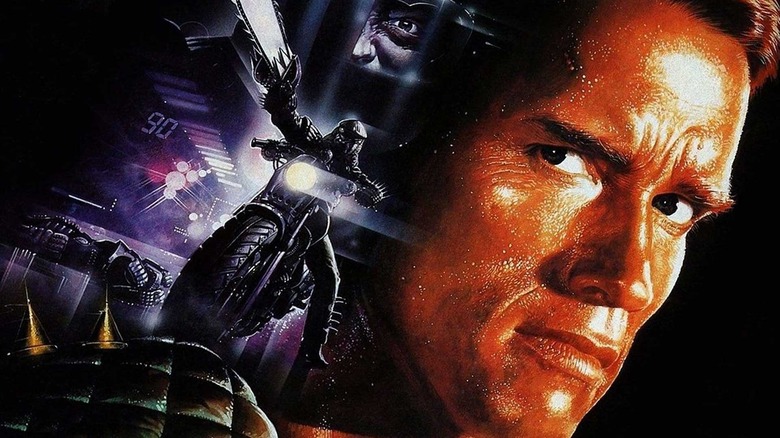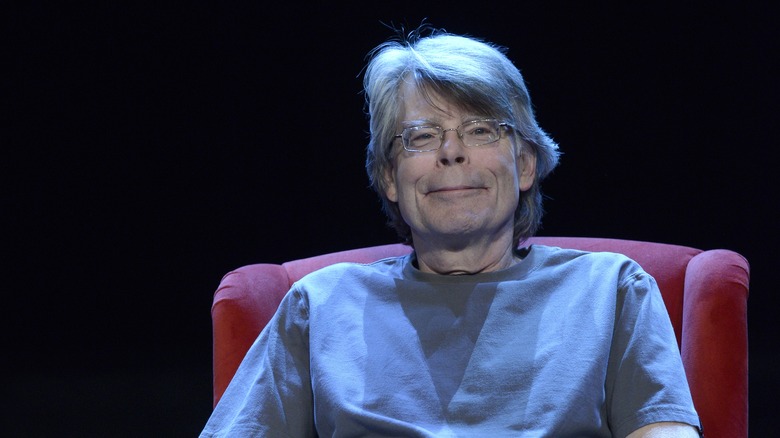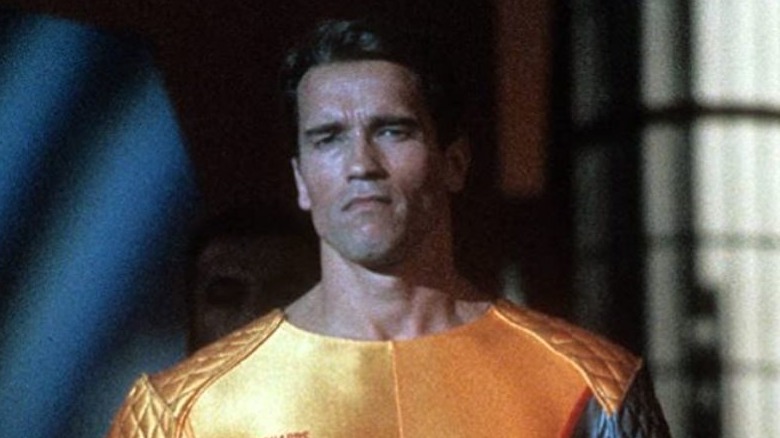The Reason Stephen King Never Liked The Running Man Adaptation
There are only three absolutes in this world: death, taxes, and one of Stephen King's novels receiving a film or television adaptation. The Master of Horror has seen his short stories and novels adapted countless times over the years, from classics like "Carrie" and "Misery" to lesser-known stories like "The Tommyknockers." Some have received critical acclaim, such as Andy Muschietti's "It" and Mike Flanagan's "Doctor Sleep"; others have led people to just, well, decide to stick to the books. (Here's where I take a moment to weep over the untapped potential of King's "Dark Tower" novels, which somehow botched having a grade-A lead in Idris Elba when that series hit the big screen.)
King's opinions on adaptations of his work tend to vary; for the most part, he tends to wish filmmakers well and remain hands-off. Only a few adaptations have earned his ire — and one of them happens to be the Arnold Schwarzenegger action vehicle "The Running Man," based on the novel of the same name by King. Or rather, his short-lived pseudonym, Richard Bachman.
Lost in translation
King's dislike of "The Running Man" stems from his belief that the film strays way too far from its text. The original novel follows Ben Richards, who is barely scraping by in a dystopian future and decides to enter the titular reality show contest — and ends up literally running for his life as regular citizens and trained hunters seek a bounty on his head. It's one of the bleakest things King has ever written; the economy is in shambles, Richards's daughter is on the edge of death, and he only enters the Running Man contest because he's been blacklisted from his trade. He literally has no options left but to enter the contest
The film adaptation of "The Running Man," on the other hand, is a high-octane action thriller that features fights against high-tech mercenaries and an ending where the main villain is sent flying into an exploding soda ad; there's no social commentary or bleak ending to muse over. King also took umbrage with the casting of Schwarzenegger, noting in his memoir "On Writing: A Memoir of the Craft" that his take on Richards was "as far away from the Arnold Schwarzenegger character in the movie as you can get." It shouldn't be a surprise that "The Running Man" holds the (dis)honor of joining a rare trio of adaptations that King has expressed his dislike for, including Stanley Kubrick's "The Shining" and "Firestarter".
The last (thing this character should be is an) action hero
Ironically, Schwarzenegger was on the same page as King — in his own memoir "Total Recall: My Unbelievably True Life Story", he felt director Paul Michael Glaser failed to latch onto the deeper themes of the book during filming and treated the shoot as a high-end television series. And even more ironically, the film ended up predicting the rise of reality TV — the popular "American Gladiators" show was described to be "The Running Man, minus the killing". No, really.
The Running Man is slated for a remake at Paramount with Edgar Wright ("Last Night in Soho") at the helm; Wright has a great eye for satire, with his Cornetto Trilogy serving as proof. I think he could definitely inject the same sense of helplessness into his version that permeated the original text, and also cast an actor for Richards that's more in line with the book's version — maybe his longtime collaborator Simon Pegg? He'd also know to excise the book's more outdated elements — particularly the racist and sexist bits. I also hope that Wright manages to find an alternate ending, considering how it bears an unsettling resemblance to the events of 9/11.
Honestly, the only way to go is up. And hopefully, they'll look back to what made King's source material work and double down on that. Then everyone wins.


